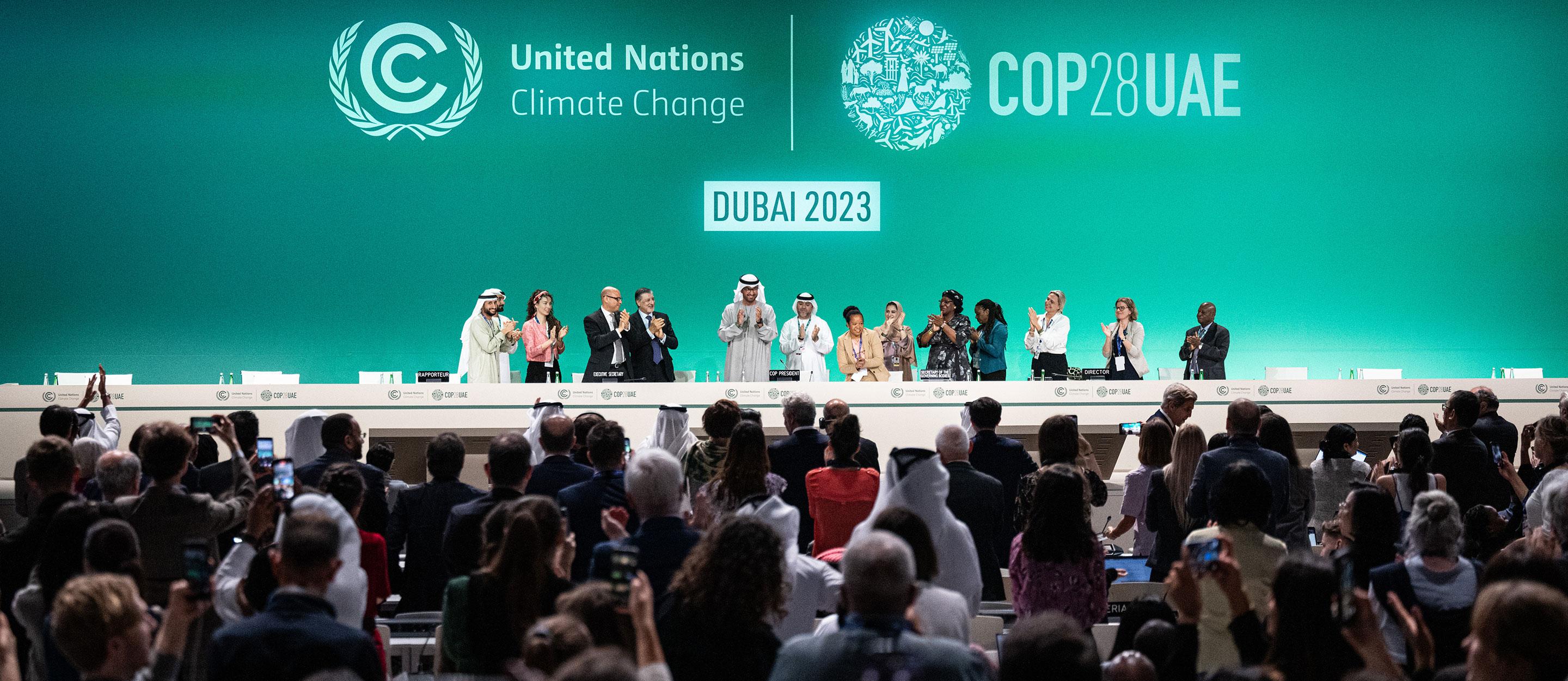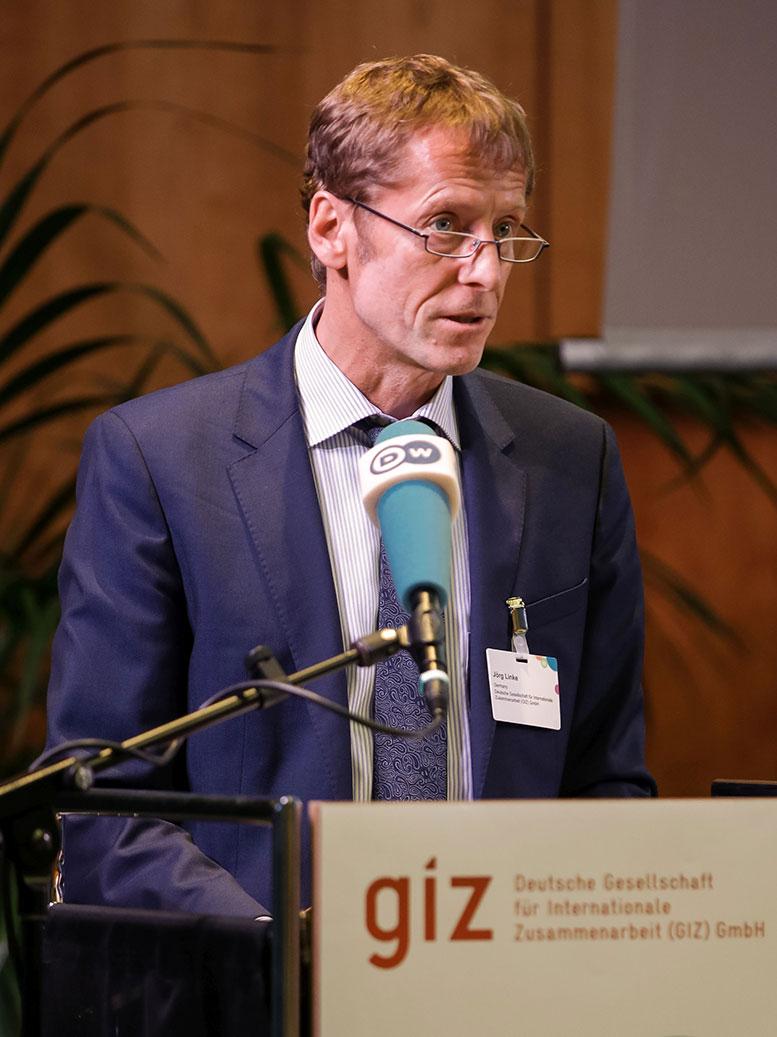 picture alliance/dpa
picture alliance/dpa
‘A big step forward’
Jörg Linke, Head of GIZ’s Competence Centre for Climate Change, explains in an interview with akzente why the outcome of COP28 in Dubai was better than expected.
An oil state hosting the climate conference – hopes ahead of COP28 were rather modest. Were the concerns justified?
In the end, the conference turned out better than we had all expected. The United Arab Emirates organised the COP very professionally and managed it prudently. Chief negotiator Sultan Ahmed Al Jaber played a constructive role, moved the debate forward and contributed to a remarkable outcome despite the initial, inadequate draft of the declaration.
Before we talk about the content, what was the atmosphere like in Dubai?
Genuinely, very positive. You could sense from the start that there was a will to be more ambitious. This was true of the negotiators as well as of the representatives from the private sector. They, too, have put a great deal of thought into climate action and how a more ambitious approach might be taken. They, too, realise in the meantime that their business models will have to change in the face of rising global temperatures.
What in your opinion was the most important outcome of this COP?
The confirmation of the 1.5 degree target and then quite clearly the passage on fossil fuels, which are explicitly mentioned in the declaration for the first time. The final text now states that we are to move away from fossil fuels. This exact wording is: ‘transitioning away from fossil fuels.’ This is the beginning of the end for all fossil fuels and at the same time represents a clear acknowledgement that we cannot continue as before.
Although the wording is vague, you still consider it a success?
This is definitely new in this form and clearly constitutes progress.
Is this the big turning point in your opinion – a new dawn for international climate policy, so to speak?
The move away from fossil fuels is now documented and enshrined in the COP28 declaration. Whether this will result in a turning point for climate policy depends crucially on how quickly the countries complete this transformation, on how they implement it.
It was also decided to triple renewable energy capacity by 2030, and to double energy efficiency. How important was that?
I also consider this passage to be very relevant. Incidentally, it was the EU that introduced it.
Are those realistic goals?
According to the International Energy Agency, 2023 saw a new record in the expansion of renewable energies, and it is even set to be surpassed this year. This means that a lot is happening here, now that renewables are more cost-effective and competitive than oil, gas and coal. Against this backdrop, it is reasonable to assume that tripling them by 2030 is possible.
There were also new developments in terms of ‘loss and damage’ …
That was an area in which there was a breakthrough right at the beginning of the COP. Normally, such commitments are only made towards the end of a climate conference. This time, Germany, together with the United Arab Emirates, immediately sent a strong signal when they each pledged USD 100 million to the loss and damage fund. The fund is intended to provide financial support to developing countries in the event of damage caused by major floods or droughts, for example. Money can then be paid out from the fund. The concept of ‘loss and damage’ was introduced at COP27 at the end of 2022, but had not yet been spelled out in detail. With these commitments, the fund is now operational.
Have other countries followed suit?
The commitment did indeed serve as a signal. Meanwhile, 18 countries and the European Commission have announced that they will contribute a total of around USD 700 million – besides the United Arab Emirates and Germany, this includes France, Italy, the Netherlands, the United Kingdom, Denmark, Spain, Ireland and the United States.
Is that sum impressive – given the expected damage, especially in developing countries?
It’s certainly not nearly enough, but it’s a good start.
Are there any other points that you would qualify as progress?
Methane is mentioned prominently. Emissions of the gas are to be substantially reduced by 2030, according to the declaration. This is important because methane is still a widely underestimated danger, as it is significantly more harmful to the climate than CO2. There is great potential for reducing methane emissions, not only in oil and gas production, but also in agriculture and the waste sector. Germany has now made a strong commitment to the issue and represents Europe as a champion in the implementation of the Global Methane Pledge.
At this COP, the topic of nature and biodiversity seems to have moved up the agenda. Is that your impression too?
Absolutely. There is now talk of a dual crisis. We know that biodiversity and climate reinforce each other – both positively and negatively. Forests and moors, for example, are natural carbon sinks that store climate-damaging gases. If nature is lost, that fuels climate change. Conversely, higher temperatures accelerate the loss of species. This connection has now been officially recognised.
Sounds like it was a successful COP all round …
In my opinion, the conference was a COP of ambiguities. On the one hand, we had the successful outcomes already mentioned, which were not necessarily to be expected beforehand in view of the strong lobby of the oil states. On the other hand, despite the financial commitments, this is not enough given the dramatic nature of the situation: progress is still too slow and still not extensive enough. The attendance in Dubai was also massive; almost 100,000 people were there. Such large events are neither necessary nor sustainable.
What are the implications of the COP for GIZ?
We can get involved in every area: in the expansion of renewable energies as well as in improving energy efficiency, in methane programmes, in adapting to climate change and in biodiversity. And we can continue to participate in the international dialogue. And that’s what we’re going to do.
What happens next? What needs to happen next?
This year, Azerbaijan is hosting the climate conference, another oil state that is in the process of switching to renewable energies – a transformation in progress, if you like, which we are all in the midst of and which still needs to accelerate significantly. And then, in 2025, comes the COP in Brazil, in the Amazon region. This will certainly be significant because of its symbolic nature. The Brazilians have also already announced that they want to downsize the COP and make it more sustainable. That, too, would be a step in the right direction.
 wolterfoto.de/Norbert Ittermann
wolterfoto.de/Norbert Ittermann
Jörg Linke, Head of GIZ’s Competence Centre for Climate Change

